|
|
|
Sort Order |
|
|
|
Items / Page
|
|
|
|
|
|
|
| Srl | Item |
| 1 |
ID:
159905
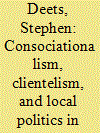

|
|
|
|
|
| Summary/Abstract |
Both liberal and corporatist consociational systems are often characterized by identity-based networks that rely on clientelism and are difficult to hold accountable. This article uses Beirut's 2015 garbage crisis and 2016 municipal elections to argue that cities can be important sites for building new civic networks because cities often have resources and frames that can be used to mobilize individuals in different ethnosectarian networks. These civic networks, by promoting ideas of citizenship and state accountability, can be a significant factor in increasing liberalism in consociational systems.
|
|
|
|
|
|
|
|
|
|
|
|
|
|
|
|
| 2 |
ID:
111491


|
|
|
|
|
| Publication |
2012.
|
| Summary/Abstract |
In order to bolster sustainable peace building in violently divided societies, a normative suggestion is that efforts should be made to construct a shared public identity that overarches ethnic divisions. A number of different centripetal/transformationist processes are identified as engineering a shared identity in comparison to consociational arrangements, which are accused of institutionalising ethnic differences and perpetuating conflict. These transformationist approaches essentially rest on the premise that because ethnicity is constructed it can be reconstructed into new, shared forms. Looking at Northern Ireland, we argue that there are limits to the extent that ethnicity can be reconstructed into shared identities. By analysing consociational and centripetalist/transformationist approaches to division, we conclude that although consociationalism will probably not deliver a common identity, it does provide a robust form of conflict regulation.
|
|
|
|
|
|
|
|
|
|
|
|
|
|
|
|
| 3 |
ID:
197074


|
|
|
|
|
| Summary/Abstract |
Lebanon is suffering from multiple crises, and the lack of reaction on behalf of the authorities demands a serious reflection on whether Lebanon, as a state entity, can or cannot be saved. It is facing the end of the Second Republic or witnessing the birth of a new political order alien to the former. Although the Lebanese speak the same language and share many cultural and social traditions, the weakening of the central government, its inability to resolve many crises, and deep differences over Lebanon’s regional positioning favor the withdrawal of communities and create fertile ground for the resurgence of the federalist debate. The article argues that the most suitable option to overcome the current stalemate relies not on federalism or partition but on modifying the power-sharing system. The persistent issues arising from implementing semi-consociationalism are highlighted to argue that restoring a fully developed consociational system would enable Lebanon to regain its political stability and order, better equipping it to confront future challenges.
|
|
|
|
|
|
|
|
|
|
|
|
|
|
|
|
| 4 |
ID:
127020
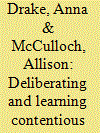

|
|
|
|
|
| Publication |
2013.
|
| Summary/Abstract |
History education can either exacerbate polarization and division or it can have conciliatory potential. Looking at a number of divided societies, we identify trends in curriculum portrayals of inter-group conflict. Noting the power of re-telling the past, we argue for a conciliatory approach to textbook design that entails the inclusion of multiple narratives. We detail why groups need to set out their own account of events and discuss the importance of the way that groups develop their accounts. We recommend an institutional, process-based approach to textbook design grounded in the values of deliberative consociationalism and argue that the conciliatory approach is best pursued in a two-stage model of deliberations. We develop this model and focus on how deliberations might occur and with what restrictions, taking seriously concerns about the applicability of deliberation in divided societies.
|
|
|
|
|
|
|
|
|
|
|
|
|
|
|
|
| 5 |
ID:
090214
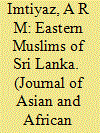

|
|
|
|
|
| Publication |
2009.
|
| Summary/Abstract |
Conflict in Sri Lanka between the Tamils and the Sinhalese brought the Eastern Muslims into the crossfire. Muslim elites and politicians generally cooperate with the Sinhalese ruling class. Such cohabitation irritated the Tamils. Since 1985, relations between the Tamils and the Muslims in the Eastern region have become strained, and Muslims claimed they have some problems to be solved. This study attempts to identify some special problems of the Eastern Muslims. A questionnaire on the special problems of the Eastern Muslims was distributed to the Eastern youth, students, unemployed Muslims and farmers. The population of the target group was selected randomly. More than 150 questionnaires were issued with a 75 percent response rate. Interviews were also conducted on the phone with an educated section of the Eastern Muslims. This study also suggests solutions to the protracted ethno-political conflict based on power sharing.
|
|
|
|
|
|
|
|
|
|
|
|
|
|
|
|
| 6 |
ID:
175356
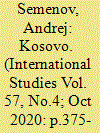

|
|
|
|
|
| Summary/Abstract |
The present tensions in Belgrade–Pristina relations highlight the relevance of a consensus regarding the question of Kosovo. This article argues that the cyclical nature of Kosovo’s history has been muted by the thesis ‘Kosovo is a unique case’ which through unilateral decisions produced various legal schizophrenias. These legal schizophrenias embodied in a power triangle—Ahtisaari Plan–European Union Rule of Law Mission in Kosovo (EULEX)–Kosovo’s Constitution. Despite gaps and inherited chaos, the indisputable achievements of the EU’s efforts in normalizing relations between Belgrade and Pristina show that the EU not only can facilitate peace but also possesses the capacity to achieve a consensus. Already there is a ‘silent’ consensus among actors on the status of Kosovo—the European protectorate. The article also discusses institutional design based on the consensus, which aims to promote shared narratives.
|
|
|
|
|
|
|
|
|
|
|
|
|
|
|
|
| 7 |
ID:
108700
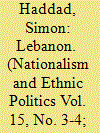

|
|
|
|
|
| Publication |
2009.
|
| Summary/Abstract |
This article seeks to interpret recent developments in Lebanon in the light of a well-known theory, consociationalism, which presents itself as a model for the government of deeply divided societies. It therefore begins by looking at the character of this particular approach to government, describing the main features of consociationalism. The next section explores the historical background to contemporary Lebanese politics, from the pre-independence period to the 2005 crisis. This is followed by a discussion of events since 2005, and of the changing dynamics of Lebanese politics. The last section seeks to interpret these events, returning to the question of consociationalism and questioning its relevance in understanding the Lebanese conflict.
|
|
|
|
|
|
|
|
|
|
|
|
|
|
|
|
| 8 |
ID:
157701


|
|
|
|
|
| Summary/Abstract |
Lebanese consociationalism has been under stress due to serious internal and external pressures. Though Lebanese regional and global leaders continue to pay lip service to Lebanon’s unity and uphold putative commitments to its sovereignty and territorial integrity, partition to resolve internal crises remains on the table. After a long and still unsettled civil war, absolute internal discord among citizens and, increasingly, the uprisings throughout the region, partition was and is once again openly discussed by many even if most camouflage it under the decentralization, federalism, or con-federalism schemes. The article underlines the inherent vulnerabilities of the Lebanese state and analyzes its deep fault lines raising a serious question about the future integrity of Lebanon.
|
|
|
|
|
|
|
|
|
|
|
|
|
|
|
|
| 9 |
ID:
190238
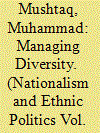

|
|
|
|
|
| Summary/Abstract |
This research seeks to enhance our understanding of consociationalism’s effectiveness in managing differences in plural societies by assessing its applicability to Pakistan. The primary objective of the paper is to determine whether consociationalism is the best solution for managing ethnic diversity in Pakistan. The article applies a mixed-methods approach and relies on secondary and primary sources. The study argues that the success of consociationalism appears uncertain in the face of intragroup party-based divisions, constant fluctuations in ethnoregional party support, the territorial nature of political grievances, and democratic instability in Pakistan. Equally, the lack of various favorable conditions for consociationalism in the case endangers its viability. In addition, the majority of all ethnolinguistic groups do not prefer consociational solutions to ethnic differences. This analysis suggests that consociationalism cannot be a one-size-fits-all solution because not all plural societies are compatible with this system. Therefore, consociationalism is not a universally viable option for all multiethnic societies, and its utility varies across cases.
|
|
|
|
|
|
|
|
|
|
|
|
|
|
|
|
| 10 |
ID:
178077
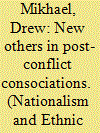

|
|
|
|
|
| Summary/Abstract |
Debates on consociationalism seek to explain how and why prescriptive power-sharing can support successful ethnic conflict management in post-conflict societies and if the differences between liberal and corporate consociationalism affect system stability. At the same time, a new and growing body of work has begun to examine the previously under-considered effects of power-sharing on “Others,” that is, those communities not in alignment with the included ethnic groups. This paper adds to understandings of liberal and corporate consociational models and their impact on a specific type of Other – “newcomers” – through interviews with civil society organizations representing their interests. Current approaches to the liberal-corporate distinction do not reflect the impact of institutional design on newcomers navigation of power-sharing systems. Through a comparative analysis of newcomer engagement in (liberal) Northern Ireland and (corporate) Lebanon, this paper will reveal how institutional design cultivates path-dependent elite behaviors that negatively impact newcomers through different policy responses.
|
|
|
|
|
|
|
|
|
|
|
|
|
|
|
|
| 11 |
ID:
171002


|
|
|
|
|
| Summary/Abstract |
This article investigates and defines the essential variables in the historical peace processes in Northern Ireland and Korea and sets essential preconditions for future peace negotiations on the Korean Peninsula. To do so, we conduct a rigorous examination of all Northern Irish agreements to indicate why past Korean peace processes have failed and to offer alternative policy suggestions. Crucial ingredients for a successful peace process are the structure of each negotiation framework, the inclusion of and concessions by key actors in each negotiation, the respect of core interests of each party, and tangible reduction of tensions.
|
|
|
|
|
|
|
|
|
|
|
|
|
|
|
|
| 12 |
ID:
111492


|
|
|
|
|
| Publication |
2012.
|
| Summary/Abstract |
This article presents a (critical realist) constructivist critique of both consociational and civil society/transformationist approaches and their crude understandings of politics and the prospects for political change. Consociationalism's primordialist or essentialist foundation leads it towards a world-weary, pessimistic, conservative realism about how far 'divided societies' may be transformed. Advocates of the civil society approach, in contrast, take an instrumentalist view of identity and are optimistic that a radical transformation can be achieved by mobilising the people against 'hard-line' political representatives. The constructivist approach can provide a framework in which a more complex and nuanced understanding of identities is possible. This better equips us for understanding the prospects of bringing about desirable political change. The first part of this article is a critique of Nagle and Clancy's consociationalism. The second part provides a brief outline of a constructivist critique of both the consociational and civil society understandings of politics and their contribution to understanding the politics of managing conflict.
|
|
|
|
|
|
|
|
|
|
|
|
|
|
|
|
| 13 |
ID:
108111
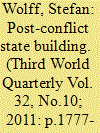

|
|
|
|
|
| Publication |
2011.
|
| Summary/Abstract |
A significant theoretical and empirical question underlying much of the literature on post-conflict state building is which institutions offer the best prospect for peace and democracy in divided societies recovering from conflict. This debate is highly relevant for many developing countries. With much invested by third parties in post-conflict reconstruction and a mixed track record of success at best, the question explored by this article is whether consociational institutional designs-widely applied in policy practice and severely criticised in academic discourse-can accomplish the twin goals of peace and democracy in divided post-conflict societies. Examining the claims of supporters and detractors of consociationalism, the article finds substantial conceptual and empirical evidence that consociational institutions hold significant promise for building democratic states after conflict in divided societies.
|
|
|
|
|
|
|
|
|
|
|
|
|
|
|
|
| 14 |
ID:
165296


|
|
|
|
|
| Summary/Abstract |
This article seeks to determine the accuracy of predictions made by researchers of Israeli politics regarding the disappearance of the consociational model in state‒religion relations, to be replaced by the emergence of a crisis model, which threatens the stability of Israeli democracy. Using a unique methodological tool, based on the relative importance assigned to the issue in the platforms of the parties, we followed the positioning of the issue on the agenda over the years, and investigated whether it was becoming more prominent since the 1990s as an indication of the crumbling of the consociational model. The findings revealed, indeed, that in the late 1990s the tension around religion‒state relations reached its peak and was reflected in a higher rank order on the agenda. However, during the twenty-first century, the tension has not been rising, while the 2015 elections show a dramatic decline in the issue’s positioning on the agenda, which refutes the researchers’ forecast.
|
|
|
|
|
|
|
|
|
|
|
|
|
|
|
|
| 15 |
ID:
186864


|
|
|
|
|
| Summary/Abstract |
Lijphart’s claim that power-sharing spurs democratization in divided societies has strongly influenced ‘institutional engineering’ and is widely accepted among scholars despite the fact that empirical tests of its merits remain rare. This article revisits the democratic effect of power-sharing, arguing that it has two antagonist faces. On the positive side, it provides guarantees of inclusion to political elites, allowing them to commit to democratic rules. On the negative side, it also has an illiberal face, entailing limits on competition and individual rights. In this article, these contrary characteristics are traced back to two institutional types of power-sharing: a more flexible and open, liberal, type and a more rigid, corporate one. Using a novel dataset on power-sharing rules for 138 multi-ethnic countries and the period from 1945 to 2016, their respective democratic merits are tested. Conforming to theoretical expectations, the findings indicate that only liberal forms of power-sharing exhibit strong positive effects on democracy while corporate forms exert mixed or even negative ones. These findings are robust to a series of alternate model specifications and operationalizations as well as to instrumental variable approaches. In conclusion, the article indicates only a partial democratic effect of power-sharing, limited to its liberal subtype.
|
|
|
|
|
|
|
|
|
|
|
|
|
|
|
|
|
|
|
|
|